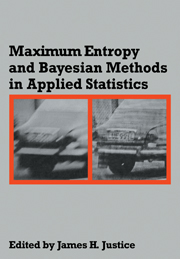 Maximum Entropy and Bayesian Methods in Applied Statistics
Maximum Entropy and Bayesian Methods in Applied Statistics Book contents
- Frontmatter
- Contents
- Preface
- Donors
- Bayesian Methods: General Background
- Monkeys, Kangaroos, and N
- The Theory and Practice of the Maximum Entropy Formalism
- Bayesian Non-Parametric Statistics
- Generalized Entropies and the Maximum Entropy Principle
- The Probability of a Probability
- Prior Probabilities Revisited
- Band Extensions, Maximum Entropy and the Permanence Principle
- Theory of Maximum Entropy Image Reconstruction
- The Cambridge Maximum Entropy Algorithm
- Maximum Entropy and the Moments Problem: Spectroscopic Applications
- Maximum-Entropy Spectrum from a Non-Extendable Autocorrelation Function
- Multichannel Maximum Entropy Spectral Analysis Using Least Squares Modelling
- Multichannel Relative-Entropy Spectrum Analysis
- Maximum Entropy and the Earth's Density
- Entropy and Some Inverse Problems in Exploration Seismology
- Principle of Maximum Entropy and Inverse Scattering Problems
- Index
Multichannel Maximum Entropy Spectral Analysis Using Least Squares Modelling
Published online by Cambridge University Press: 04 May 2010
- Frontmatter
- Contents
- Preface
- Donors
- Bayesian Methods: General Background
- Monkeys, Kangaroos, and N
- The Theory and Practice of the Maximum Entropy Formalism
- Bayesian Non-Parametric Statistics
- Generalized Entropies and the Maximum Entropy Principle
- The Probability of a Probability
- Prior Probabilities Revisited
- Band Extensions, Maximum Entropy and the Permanence Principle
- Theory of Maximum Entropy Image Reconstruction
- The Cambridge Maximum Entropy Algorithm
- Maximum Entropy and the Moments Problem: Spectroscopic Applications
- Maximum-Entropy Spectrum from a Non-Extendable Autocorrelation Function
- Multichannel Maximum Entropy Spectral Analysis Using Least Squares Modelling
- Multichannel Relative-Entropy Spectrum Analysis
- Maximum Entropy and the Earth's Density
- Entropy and Some Inverse Problems in Exploration Seismology
- Principle of Maximum Entropy and Inverse Scattering Problems
- Index
Summary
ABSTRACT
Autoregressive data modelling using the least-squares linear prediction method is generalized for multichannel time series. A recursive algorithm is obtained for the formation of the system of multichannel normal equations which determine the least-squares solution of the multichannel linear prediction problem. Solution of these multichannel normal equations is accomplished by the Cholesky factorization method. The corresponding multichannel Maximum Entropy spectrum derived from these least-squares estimates of the autoregressive model parameters is compared to that obtained using parameters estimated by a multichannel generalization of Burg's algorithm. Numerical experiments have shown that the multichannel spectrum obtained by the least-squares method provides for more accurate frequency determination for truncated sinusoids in the presence of additive white noise.
INTRODUCTION
Multi-channel generalizations of Burg's1–3 now-classical algorithm for the modelling of data as an auto-regressive sequence and therefore estimation of its equivalent maximum entropy spectrum have been obtained independently by several authors (Jones, Nuttal, Strand, Morf et al., Tyraskis and Tyraskis and Jensen. For single-channel data, Ulrych and Claytonll have also introduced an alternative procedure which is commonly described as ‘the exact-leastsquares method’ for the estimation of the autoregressive data model parameters from which a spectrum can be directly obtained. This method has been further developed and extended and efficient recursive computational algorithms have been provided by Barrodale and Errickson and Marplel. The exact least-squares method has been demonstrated to allow much improved spectral resolution and accuracy when compared to Burg's algorithm for single-channel time series although Burgapos;s algorithm requires somewhat less computational time and storage.
- Type
- Chapter
- Information
- Maximum Entropy and Bayesian Methods in Applied StatisticsProceedings of the Fourth Maximum Entropy Workshop University of Calgary, 1984, pp. 212 - 234Publisher: Cambridge University PressPrint publication year: 1986


